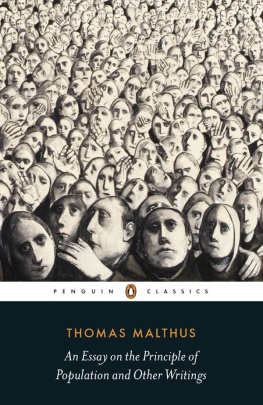Malthus Thomas-Robert - Observations on the Effects of the Corn Laws
Here you can read online Malthus Thomas-Robert - Observations on the Effects of the Corn Laws full text of the book (entire story) in english for free. Download pdf and epub, get meaning, cover and reviews about this ebook. genre: Science / Business. Description of the work, (preface) as well as reviews are available. Best literature library LitArk.com created for fans of good reading and offers a wide selection of genres:
Romance novel
Science fiction
Adventure
Detective
Science
History
Home and family
Prose
Art
Politics
Computer
Non-fiction
Religion
Business
Children
Humor
Choose a favorite category and find really read worthwhile books. Enjoy immersion in the world of imagination, feel the emotions of the characters or learn something new for yourself, make an fascinating discovery.
- Book:Observations on the Effects of the Corn Laws
- Author:
- Genre:
- Rating:3 / 5
- Favourites:Add to favourites
- Your mark:
- 60
- 1
- 2
- 3
- 4
- 5
Observations on the Effects of the Corn Laws: summary, description and annotation
We offer to read an annotation, description, summary or preface (depends on what the author of the book "Observations on the Effects of the Corn Laws" wrote himself). If you haven't found the necessary information about the book — write in the comments, we will try to find it.
Observations on the Effects of the Corn Laws — read online for free the complete book (whole text) full work
Below is the text of the book, divided by pages. System saving the place of the last page read, allows you to conveniently read the book "Observations on the Effects of the Corn Laws" online for free, without having to search again every time where you left off. Put a bookmark, and you can go to the page where you finished reading at any time.
Font size:
Interval:
Bookmark:
The Project Gutenberg EBook of Observations on the Effects of the Corn
Laws, and of a Rise or Fall in the Price of Corn on the Agriculture and General Wealth of the Country, by Thomas Malthus
This eBook is for the use of anyone anywhere at no cost and with
almost no restrictions whatsoever. You may copy it, give it away or
re-use it under the terms of the Project Gutenberg License included
with this eBook or online at www.gutenberg.net
Title: Observations on the Effects of the Corn Laws, and of a Rise or Fall in the Price of Corn on the Agriculture and General Wealth of the Country
Author: Thomas Malthus
Posting Date: July 25, 2009 [EBook #4334]
Release Date: August, 2003
First Posted: January 11, 2002
Language: English
*** START OF THIS PROJECT GUTENBERG EBOOK EFFECTS OF THE CORN LAWS ***
Produced by Charles Aldarondo. HTML version by Al Haines.
and of a Rise or Fall in the Price of Corn on the Agriculture
and General Wealth of the Country
1814.
A revision of the corn laws, it is understood, is immediately to come under the consideration of the legislature. That the decision on such a subject, should be founded on a correct and enlightened view of the whole question, will be allowed to be of the utmost importance, both with regard to the stability of the measures to be adopted, and the effects to be expected from them.
For an attempt to contribute to the stock of information necessary to form such a decision, no apology can be necessary. It may seem indeed probable, that but little further light can be thrown on a subject, which, owing to the system adopted in this country, has been so frequently the topic of discussion; but, after the best consideration which I have been able to give it, I own, it appears to me, that some important considerations have been neglected on both sides of the question, and that the effects of the corn laws, and of a rise or fall in the price of corn, on the agriculture and general wealth of the state, have not yet been fully laid before the public.
If this be true, I cannot help attributing it in some degree to the very peculiar argument brought forward by Dr Smith, in his discussion of the bounty upon the exportation of corn. Those who are conversant with the Wealth of nations, will be aware, that its great author has, on this occasion, left entirely in the background the broad, grand, and almost unanswerable arguments, which the general principles of political economy furnish in abundance against all systems of bounties and restrictions, and has only brought forwards, in a prominent manner, one which, it is intended, should apply to corn alone. It is not surprising that so high an authority should have had the effect of attracting the attention of the advocates of each side of the question, in an especial manner, to this particular argument. Those who have maintained the same cause with Dr Smith, have treated it nearly in the same way; and, though they may have alluded to the other more general and legitimate arguments against bounties and restrictions, have almost universally seemed to place their chief reliance on the appropriate and particular argument relating to the nature of corn.
On the other hand, those who have taken the opposite side of the question, if they have imagined that they had combated this particular argument with success, have been too apt to consider the point as determined, without much reference to the more weighty and important arguments, which remained behind.
Among the latter description of persons I must rank myself. I have always thought, and still think, that this peculiar argument of Dr Smith, is fundamentally erroneous, and that it cannot be maintained without violating the great principles of supply and demand, and contradicting the general spirit and scope of the reasonings, which pervade the Wealth of nations.
But I am most ready to confess, that, on a former occasion, when I considered the corn laws, my attention was too much engrossed by this one peculiar view of the subject, to give the other arguments, which belong to it, their due weight.
I am anxious to correct an error, of which I feel conscious. It is not however my intention, on the present occasion, to express an opinion on the general question. I shall only endeavour to state, with the strictest impartiality, what appear to me to be the advantages and disadvantages of each system, in the actual circumstances of our present situation, and what are the specific consequences, which may be expected to result from the adoption of either. My main object is to assist in affording the materials for a just and enlightened decision; and, whatever that decision may be, to prevent disappointment, in the event of the effects of the measure not being such as were previously contemplated. Nothing would tend so powerfully to bring the general principles of political economy into disrepute, and to prevent their spreading, as their being supported upon any occasion by reasoning, which constant and unequivocal experience should afterwards prove to be fallacious.
We must begin, therefore, by an inquiry into the truth of Dr Smith's argument, as we cannot with propriety proceed to the main question, till this preliminary point is settled.
The substance of his argument is, that corn is of so peculiar a nature, that its real price cannot be raised by an increase of its money price; and that, as it is clearly an increase of real price alone which can encourage its production, the rise of money price, occasioned by a bounty, can have no such effect.
It is by no means intended to deny the powerful influence of the price of corn upon the price of labour, on an average of a considerable number of years; but that this influence is not such as to prevent the movement of capital to, or from the land, which is the precise point in question, will be made sufficiently evident by a short inquiry into the manner in which labour is paid and brought into the market, and by a consideration of the consequences to which the assumption of Dr Smith's proposition would inevitably lead.
In the first place, if we inquire into the expenditure of the labouring classes of society, we shall find, that it by no means consists wholly in food, and still less, of course, in mere bread or grain. In looking over that mine of information, for everything relating to prices and labour, Sir Frederick Morton Eden's work on the poor, I find, that in a labourer's family of about an average size, the articles of house rent, fuel, soap, candles, tea, sugar, and clothing, are generally equal to the articles of bread or meal. On a very rough estimate, the whole may be divided into five parts, of which two consist of meal or bread, two of the articles above mentioned, and one of meat, milk, butter, cheese, and potatoes. These divisions are, of course, subject to considerable variations, arising from the number of the family, and the amount of the earnings. But if they merely approximate towards the truth, a rise in the price of corn must be both slow and partial in its effects upon labour. Meat, milk, butter, cheese, and potatoes are slowly affected by the price of corn; house rent, bricks, stone, timber, fuel, soap, candles, and clothing, still more slowly; and, as far as some of them depend, in part or in the whole, upon foreign materials (as is the case with leather, linen, cottons, soap, and candles), they may be considered as independent of it; like the two remaining articles of tea and sugar, which are by no means unimportant in their amount.
Font size:
Interval:
Bookmark:
Similar books «Observations on the Effects of the Corn Laws»
Look at similar books to Observations on the Effects of the Corn Laws. We have selected literature similar in name and meaning in the hope of providing readers with more options to find new, interesting, not yet read works.
Discussion, reviews of the book Observations on the Effects of the Corn Laws and just readers' own opinions. Leave your comments, write what you think about the work, its meaning or the main characters. Specify what exactly you liked and what you didn't like, and why you think so.






